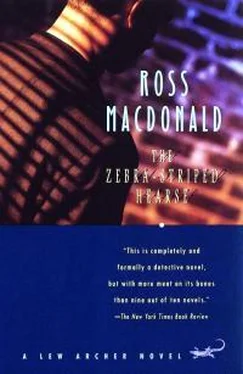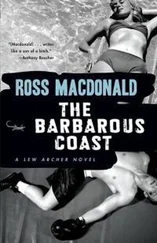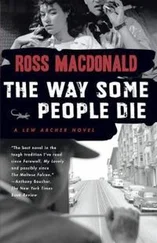“Why?”
“We don’t get along. We never have. She thinks I’m a silly flibbertigibbet. Maybe I am. I think she is a hypocrite.”
“I’d be interested in your reasons.”
“They’re simple enough. Isobel has always pretended to despise money and the things it can buy. Plain living and high thinking was her motto. But I notice she grabbed Mark and his money the first good chance she got. Please don’t quote me to Isobel. In fact, you better not tell her that you saw me.”
I said I wouldn’t. “One more question, Mrs. Hatchen. What happens to Ada’s trust fund if Harriet doesn’t live to enjoy it?”
“I suppose it reverts to Mark. Nearly everything does.”
THE MAID reluctantly let me in. I waited in the hallway, counting the pieces in the parquetry and wishing that I had never seen Isobel Blackwell, or taken her money, or liked her. She finally appeared, wearing the same dark suit and the same dark patches under her eyes. Her movements were carefully controlled, as if she was walking a line.
She said with unsmiling formality: “I hope the importance of your news justifies this late-night visit.”
“It does. Can we sit down?”
She took me into the drawing room, under the eyes of the ancestors. I said to them as well as to her: “I’m doing you a favor coming here. If you weren’t my client, there’d be policemen instead, and reporters trampling the roses.”
“Am I supposed to understand that?” Her speech was slurred, and her eyes had a drugged look. “If I am, you’ll have to explain it to me. And please bear in mind that I may not be thinking too clearly – I’m full of chloral hydrate. Now what were you saying about policemen and newspapermen?”
“They’ll be here tomorrow. They’ll be wanting to know, among other things, if you have an icepick with a square-cut silver handle.”
“We do have, yes. I haven’t seen it lately, but I assume it’s somewhere in the kitchen, or one of the portable bars.”
“I can tell you now it isn’t. It’s in the hands of Sergeant Wesley Leonard of the Citrus County Sheriff’s Department.”
I was watching her closely, and she seemed genuinely perplexed. “Are you trying to threaten me in some way? You sound as though you were.”
“The word is warn, Mrs. Blackwell.”
Her voice sharpened. “Has something happened to Mark?”
“Something has happened to Ralph Simpson and Dolly Stone. I think both those people were known to you.”
“Dolly Stone? I haven’t even seen the girl in years.”
“I hope you can prove that, because Dolly was murdered last May.”
She lowered her head and moved it from side to side, as if she was trying to dodge the fact. “You must be joking.” She stole a look at my face and saw that I was not. “How? How was she murdered?”
“She was strangled, by unknown hands.”
Isobel Blackwell looked at her hands. They were slender and well kept, but the knuckles suggested a history of work. She massaged the knuckles, as if she might be trying to erase the history.
“You surely can’t imagine that I had anything to do with it. I had no idea that Dolly was dead. I was quite close to her at one time – she was virtually my foster daughter – but that was years ago.”
“She was your foster daughter?”
“That may be putting it too strongly. Dolly was one of my projects. The Stones lived across the road from us, and I couldn’t help noticing the beginnings of antisocial tendencies in the child. I did my best to provide her with an example and steer her clear of delinquency.” Her voice was cool and careful. “Did I fail?”
“Somebody failed. You sound a little like a social worker, Mrs. Blackwell.”
“I was one before I married my first husband.”
“Ronald Jaimet.”
She raised her brows. Under them, her eyes appeared strangely naked. “Suddenly you know a great deal about my affairs.”
“Suddenly your affairs are at the center of this case. When I found out tonight that you knew Dolly Stone and her parents, it knocked most of my ideas sideways. I’m trying to work up a new set of ideas, and I can’t do it without your co-operation.”
“I’m still very much in the dark. I’m not even sure what case we’re talking about.”
“It’s all one case,” I said, “Harriet’s disappearance and Dolly’s death and the murder of Ralph Simpson, who was stabbed with an icepick–”
“My icepick?”
“That’s the police hypothesis. I share it. I’m not accusing you of doing the actual stabbing.”
“How good of you.”
“The fact remains that you knew Ralph Simpson, you were almost certainly aware of his death, and you said nothing about it.”
“Is this the same Ralph Simpson who worked for us at Tahoe in the spring?”
“The same. A day or two after he left you he was stabbed to death and buried in the back yard of the house you used to own in Citrus Junction.”
“But that’s insane, utterly insane.”
“You knew about it, didn’t you?”
“I did not. You’re quite mistaken.”
“There’s an account of the Simpson killing on the front page of the Citrus Junction paper in your sitting room.”
“I haven’t read it. I take the paper, to keep track of old friends, but I’m afraid I seldom look at it. I haven’t even glanced at it this week.”
I couldn’t tell if she was lying. Her face had become a stiff mask which refused to tell what went on in the mind behind it. Her eyes had veiled themselves. Guilt can effect those changes. So can innocent fear.
“You have sharp eyes, don’t you, Mr. Archer? Unfriendly eyes.”
“Objective eyes, I hope.”
“I’m not fond of your objectivity. I thought there was a – degree of confidence between us.”
“There was .”
“You put that emphatically in the past tense. Since you’ve been operating with my money, operating on me in fact, I would have expected a little more tolerance, and sympathy. You realize my connection with Dolly proves nothing whatever against me.”
“I’d be glad to see that proved.”
“How can I prove it?”
“Tell me more about Dolly. For instance, what were the antisocial tendencies you noticed in her?”
“Must I? I’ve only just learned of her death. It’s distressing to rake over the past under the circumstances.”
“The past is the key to the present.”
“You’re quite a philosopher,” she said with some irony.
“I’m simply a detective with quite a few murder cases under my belt. People start out young on the road to becoming murderers. They start out equally young on the road to becoming victims. When the two roads intersect, you have a violent crime.”
“Are you suggesting that Dolly was a predestined victim?”
“Not predestined, but prepared. What prepared her, Mrs. Blackwell?”
“I didn’t, if that’s what you’re thinking.” She paused, and took a deep breath. “Very well, I’ll try to give you a serious answer. I was concerned about Dolly, from the time she was four or five. She wasn’t relating too well to other children. Her relationship with adults wasn’t right, either, and it got worse. It showed up particularly in her contacts with my husband. Dolly was a pretty little thing, and her father had treated her seductively and then rejected her. It’s a common pattern. The Stones aren’t bad people, but they’re ignorant people, lacking in insight. They were our good neighbors, however, and Ronald and I believed in helping our neighbors as best we could. We tried to provide Dolly with a more normal family constellation–”
“And yourselves with a daughter?”
“That’s an unkind remark.” Her anger showed through her mask. She forced it back. “It’s true, we couldn’t have children; Ronald had a diabetic condition. I’m also aware of the ease with which good white magic turns into bad black magic. But we made no attempt to take Dolly from her parents, emotionally or otherwise. We merely tried to give her some things they couldn’t – books and music and recreation and the company of understanding people.”
Читать дальше












